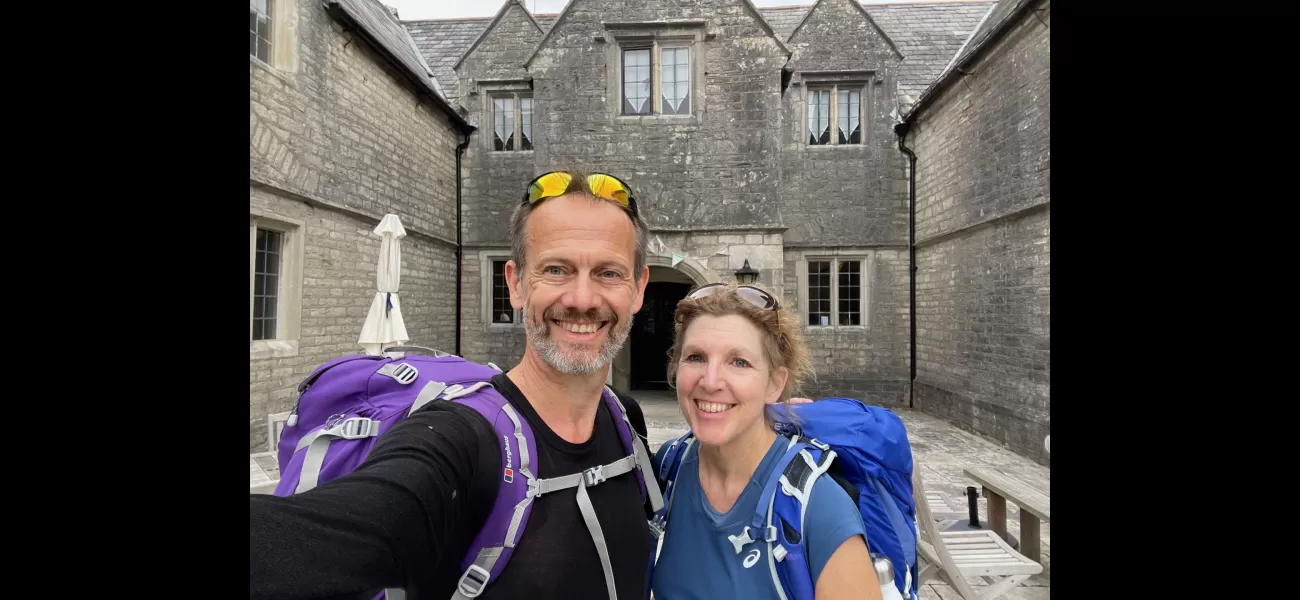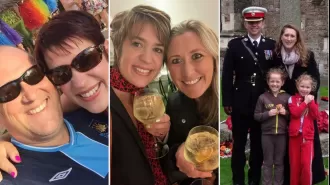I thought I was experiencing IBS symptoms, but doctors advised me to prepare for a trip.
I was informed that my life expectancy is only 18 months to 2 years.
August 10th 2024.

My husband and I made the difficult decision for my mum to drive me to the hospital for my appointment for palliative care. I had heard the term before, but didn't fully understand what it meant. I turned to Google to see if it had a more positive connotation, but unfortunately, it did not.
The previous day, a doctor had uttered those words to me after I had been diagnosed with bowel cancer at the age of 46 in 2017. The thought of palliative treatment, which focuses on alleviating symptoms rather than curing the cancer, was terrifying. I had been feeling unwell for about 18 months and had been trying to figure out what was wrong with me for a year. However, I didn't want to make a fuss, so I didn't push for answers.
I had been dealing with bowel issues and IBS since my teenage years, so I assumed that my worsening symptoms - alternating between constipation and diarrhea, bloating, and stomach aches - were just a result of getting older, stress, and perimenopause. Food had become a source of pain and discomfort, making it difficult for me to eat.
Initially, my GP ran some blood tests which showed high inflammatory markers. I was prescribed antibiotics which helped alleviate my symptoms, and my GP didn't seem too concerned about it, so I didn't follow up. However, by January 2017, my condition had worsened. I constantly felt the urge to use the bathroom, but nothing would happen. I also experienced lower abdominal pains and sometimes saw a slight pinkness on the toilet paper after wiping.
After multiple visits to my GP, I was finally referred to a gastro-intestinal consultant. Unfortunately, while waiting for my first scan in September, my health took a turn for the worse. The pain and discomfort from eating had become unbearable, causing me to drop three stone in just eight months.
At this point, I was experiencing severe stomach pains, vomiting, and was unable to have any bowel movements. I couldn't wait any longer, so I decided to get a private consultation for my scan, as the original appointment was not until November.
Two days after the scan, I received a call from the hospital to pack a bag and come in immediately. My husband and I made the decision for my mother to drive me while he stayed to pick up our two daughters from school, then aged 10 and 12, and explain to them what was happening. I was admitted to the hospital where I was told I needed a colonoscopy due to a blockage in my colon. The results showed that I had a tumor and the next day, I received the devastating news that I had bowel cancer and that my treatment may only be palliative.
My mind was consumed with thoughts of my two girls and how I was going to break this news to them. Luckily, the doctors agreed to operate and I was scheduled for surgery just five days later. However, I was warned that it would be an aggressive procedure. The surgery involved removing my lower sigmoid colon, part of my upper intestine, bladder, ovaries, cervix, and uterus. I was also given stomas to replace my missing colon and bladder. It was a shock to hear and I couldn't help but think that people don't usually survive this type of surgery. However, it ended up saving my life.
After spending a month in the hospital, I was overjoyed to finally go home before starting six months of chemotherapy. Talking about what had happened to me with my family and friends was emotional but also cathartic. It became easier with each conversation and it helped me come to terms with what had happened.
I was eager to put it all behind me, but with the upcoming chemotherapy, I knew I needed to focus on building up my strength. In the first week, I could only manage to walk to the end of the road. But each day, I pushed myself a little more and gradually got stronger. I was able to go on longer and faster walks.
The chemotherapy made me feel tired and sick, but for the most part, I was able to do the things I wanted to do. I experienced bloating, stomach pains, and changes in my bowel habits, but I was determined to stay as active as possible.
In conclusion, if you experience any of the following symptoms, please do not hesitate to see your doctor: bloating, tummy pain, blood in your poo, changes in your bowel habits, changes in your poo consistency, feeling like you need to go to the toilet even after just having gone, a lump in your tummy, unintentional weight loss, fatigue, and bleeding from your bottom. Early detection is key and can greatly improve your chances of surviving bowel cancer.
My husband and I had a difficult decision to make. It was time for me to go to the hospital for "Palliative care". I had heard this term before, but I wasn't entirely sure what it meant. To be honest, I had to search it up on Google to see if it had a positive connotation. Unfortunately, it didn't. This was the phrase used by the doctor who had diagnosed me with bowel cancer in 2017, when I was just 46 years old.
The term "palliative treatment" meant that the doctors were not going to try and cure my cancer, but rather focus on managing my symptoms to keep me comfortable until the end. I was terrified. I had been feeling unwell for about 18 months, but I had been putting off going to the doctor. I was hoping that it was nothing serious and I would be okay. But as my symptoms worsened, I couldn't ignore it any longer.
I had been struggling with bowel issues and IBS since I was a teenager, so I assumed that my usual symptoms of bloating, stomach aches, and alternating between diarrhea and constipation were just getting worse with age, stress, and perimenopause. However, the pain and discomfort I was experiencing from eating became unbearable. I couldn't eat without experiencing digestive pain and upset. At first, my GP ran some blood tests and noticed that my inflammatory markers were high. I was prescribed antibiotics and my symptoms improved, so I didn't think much of it. But by January 2017, things took a turn for the worse. I constantly felt like I needed to use the restroom, but nothing would happen. I also noticed some pinkness on the toilet paper and had pains in my lower belly. After multiple visits to my GP, I was finally referred to a gastro-intestinal consultant. But while waiting for my first scan in September, my health continued to decline. I lost three stone in just eight months.
Finally, I decided to book a private consultation for my scan because I couldn't wait any longer. I was terrified. Two days after the scan, I received a call from the doctors telling me to pack a bag and come to the hospital immediately. My husband and I agreed that my mum would drive me to the hospital while my husband stayed behind to pick up our two daughters from school and explain the situation to them. I was admitted to the hospital and told that I needed a colonoscopy because there was a blockage in my colon. That's when they discovered a tumor. The following day, I received the devastating news that I had bowel cancer and that my treatment options might be palliative only.
I couldn't stop thinking about my two girls and how I was going to break this news to them. However, the doctors agreed to perform surgery and I was booked in for five days later. It was a risky and "aggressive" surgery, but it ended up saving my life. They had to remove my lower sigmoid colon, parts of my upper intestine, bladder, ovaries, cervix, and uterus. To replace my missing colon and bladder, I was given stomas. It was a lot to take in, and I remember feeling like people didn't survive this type of surgery. But thankfully, I made it through.
After spending a month in the hospital, I was finally able to go home and start my six months of chemotherapy. It was a difficult time, but I found comfort in talking about what had happened. It was emotional, but also cathartic. Seeing my friends and family also helped me cope with what I had been through. I wanted to put it all behind me, but I still had to undergo chemotherapy. So, I focused on building up my strength. At first, I could only walk to the end of the road. But I kept pushing myself to walk a little further each day, and eventually, I was able to go on longer and faster walks. Chemo made me feel tired and sick, but I was still able to do most things I wanted to do.
It's important to recognize the symptoms of bowel cancer and not ignore them. Bloating, tummy pain, blood in your poo, changes in your bowel habits, changes in the appearance of your poo, a constant feeling of needing to use the restroom, a lump in your tummy, unintentional weight loss, fatigue, and bleeding from your bottom are all warning signs that should not be ignored. Don't make the same mistake I did and seek medical attention as soon as possible. It could save your life.
The previous day, a doctor had uttered those words to me after I had been diagnosed with bowel cancer at the age of 46 in 2017. The thought of palliative treatment, which focuses on alleviating symptoms rather than curing the cancer, was terrifying. I had been feeling unwell for about 18 months and had been trying to figure out what was wrong with me for a year. However, I didn't want to make a fuss, so I didn't push for answers.
I had been dealing with bowel issues and IBS since my teenage years, so I assumed that my worsening symptoms - alternating between constipation and diarrhea, bloating, and stomach aches - were just a result of getting older, stress, and perimenopause. Food had become a source of pain and discomfort, making it difficult for me to eat.
Initially, my GP ran some blood tests which showed high inflammatory markers. I was prescribed antibiotics which helped alleviate my symptoms, and my GP didn't seem too concerned about it, so I didn't follow up. However, by January 2017, my condition had worsened. I constantly felt the urge to use the bathroom, but nothing would happen. I also experienced lower abdominal pains and sometimes saw a slight pinkness on the toilet paper after wiping.
After multiple visits to my GP, I was finally referred to a gastro-intestinal consultant. Unfortunately, while waiting for my first scan in September, my health took a turn for the worse. The pain and discomfort from eating had become unbearable, causing me to drop three stone in just eight months.
At this point, I was experiencing severe stomach pains, vomiting, and was unable to have any bowel movements. I couldn't wait any longer, so I decided to get a private consultation for my scan, as the original appointment was not until November.
Two days after the scan, I received a call from the hospital to pack a bag and come in immediately. My husband and I made the decision for my mother to drive me while he stayed to pick up our two daughters from school, then aged 10 and 12, and explain to them what was happening. I was admitted to the hospital where I was told I needed a colonoscopy due to a blockage in my colon. The results showed that I had a tumor and the next day, I received the devastating news that I had bowel cancer and that my treatment may only be palliative.
My mind was consumed with thoughts of my two girls and how I was going to break this news to them. Luckily, the doctors agreed to operate and I was scheduled for surgery just five days later. However, I was warned that it would be an aggressive procedure. The surgery involved removing my lower sigmoid colon, part of my upper intestine, bladder, ovaries, cervix, and uterus. I was also given stomas to replace my missing colon and bladder. It was a shock to hear and I couldn't help but think that people don't usually survive this type of surgery. However, it ended up saving my life.
After spending a month in the hospital, I was overjoyed to finally go home before starting six months of chemotherapy. Talking about what had happened to me with my family and friends was emotional but also cathartic. It became easier with each conversation and it helped me come to terms with what had happened.
I was eager to put it all behind me, but with the upcoming chemotherapy, I knew I needed to focus on building up my strength. In the first week, I could only manage to walk to the end of the road. But each day, I pushed myself a little more and gradually got stronger. I was able to go on longer and faster walks.
The chemotherapy made me feel tired and sick, but for the most part, I was able to do the things I wanted to do. I experienced bloating, stomach pains, and changes in my bowel habits, but I was determined to stay as active as possible.
In conclusion, if you experience any of the following symptoms, please do not hesitate to see your doctor: bloating, tummy pain, blood in your poo, changes in your bowel habits, changes in your poo consistency, feeling like you need to go to the toilet even after just having gone, a lump in your tummy, unintentional weight loss, fatigue, and bleeding from your bottom. Early detection is key and can greatly improve your chances of surviving bowel cancer.
My husband and I had a difficult decision to make. It was time for me to go to the hospital for "Palliative care". I had heard this term before, but I wasn't entirely sure what it meant. To be honest, I had to search it up on Google to see if it had a positive connotation. Unfortunately, it didn't. This was the phrase used by the doctor who had diagnosed me with bowel cancer in 2017, when I was just 46 years old.
The term "palliative treatment" meant that the doctors were not going to try and cure my cancer, but rather focus on managing my symptoms to keep me comfortable until the end. I was terrified. I had been feeling unwell for about 18 months, but I had been putting off going to the doctor. I was hoping that it was nothing serious and I would be okay. But as my symptoms worsened, I couldn't ignore it any longer.
I had been struggling with bowel issues and IBS since I was a teenager, so I assumed that my usual symptoms of bloating, stomach aches, and alternating between diarrhea and constipation were just getting worse with age, stress, and perimenopause. However, the pain and discomfort I was experiencing from eating became unbearable. I couldn't eat without experiencing digestive pain and upset. At first, my GP ran some blood tests and noticed that my inflammatory markers were high. I was prescribed antibiotics and my symptoms improved, so I didn't think much of it. But by January 2017, things took a turn for the worse. I constantly felt like I needed to use the restroom, but nothing would happen. I also noticed some pinkness on the toilet paper and had pains in my lower belly. After multiple visits to my GP, I was finally referred to a gastro-intestinal consultant. But while waiting for my first scan in September, my health continued to decline. I lost three stone in just eight months.
Finally, I decided to book a private consultation for my scan because I couldn't wait any longer. I was terrified. Two days after the scan, I received a call from the doctors telling me to pack a bag and come to the hospital immediately. My husband and I agreed that my mum would drive me to the hospital while my husband stayed behind to pick up our two daughters from school and explain the situation to them. I was admitted to the hospital and told that I needed a colonoscopy because there was a blockage in my colon. That's when they discovered a tumor. The following day, I received the devastating news that I had bowel cancer and that my treatment options might be palliative only.
I couldn't stop thinking about my two girls and how I was going to break this news to them. However, the doctors agreed to perform surgery and I was booked in for five days later. It was a risky and "aggressive" surgery, but it ended up saving my life. They had to remove my lower sigmoid colon, parts of my upper intestine, bladder, ovaries, cervix, and uterus. To replace my missing colon and bladder, I was given stomas. It was a lot to take in, and I remember feeling like people didn't survive this type of surgery. But thankfully, I made it through.
After spending a month in the hospital, I was finally able to go home and start my six months of chemotherapy. It was a difficult time, but I found comfort in talking about what had happened. It was emotional, but also cathartic. Seeing my friends and family also helped me cope with what I had been through. I wanted to put it all behind me, but I still had to undergo chemotherapy. So, I focused on building up my strength. At first, I could only walk to the end of the road. But I kept pushing myself to walk a little further each day, and eventually, I was able to go on longer and faster walks. Chemo made me feel tired and sick, but I was still able to do most things I wanted to do.
It's important to recognize the symptoms of bowel cancer and not ignore them. Bloating, tummy pain, blood in your poo, changes in your bowel habits, changes in the appearance of your poo, a constant feeling of needing to use the restroom, a lump in your tummy, unintentional weight loss, fatigue, and bleeding from your bottom are all warning signs that should not be ignored. Don't make the same mistake I did and seek medical attention as soon as possible. It could save your life.
[This article has been trending online recently and has been generated with AI. Your feed is customized.]
[Generative AI is experimental.]
0
0
Submit Comment





